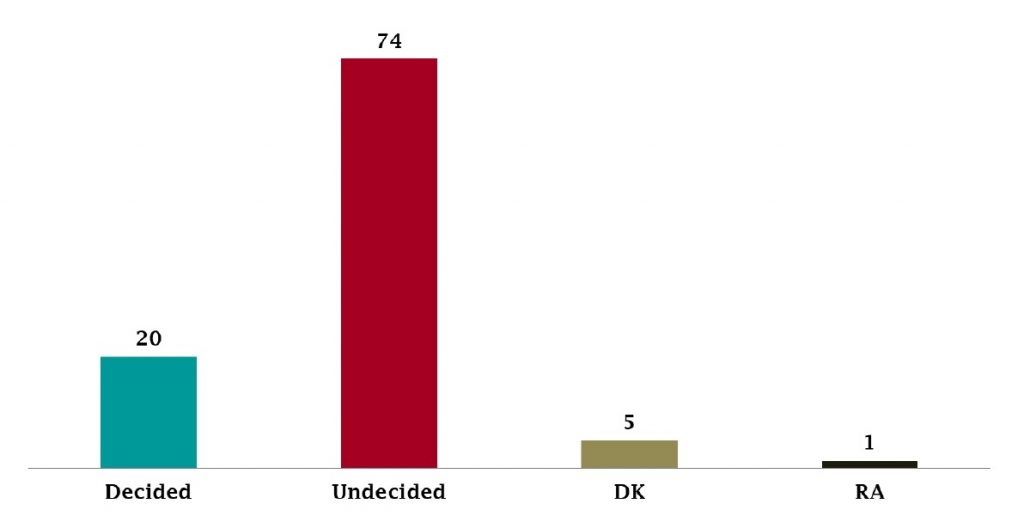The United States National Democratic Institute (NDI) released today its public opinion survey, which shows respondents’ attitudes towards broad range of issues, including the upcoming presidential elections, national issues and foreign policy.
The survey was fielded by the Caucasus Resource Research Centers (CRRC) for NDI between June 23 and July 8, with the financial assistance of the UK Aid. The poll was conducted through nationwide face-to-face interviews (excluding occupied territories of Abkhazia and Tskhinvali Region/South Ossetia) with 2,409 respondents and has a margin of error plus, minus 1,9%.
Presidential Polls, Party Support
According to the survey, asked whether they were decided about their choice if presidential elections were held tomorrow, 74% of respondents said they were undecided – “the highest figure seen in NDI’s polls to date.”
“With an election date yet to be called and uncertainty about the field of candidates, who runs could change the nature and discourse of the election,” NDI said in its press release, following the presentation of the poll results on August 1.
According to the survey, 59% of respondents said they would vote if presidential elections were held tomorrow.
Asked who they would vote for, 14% of likely voters named the ruling Georgian Dream-Democratic Georgia (GDDG); 12% – United National Movement (UNM); 7% – European Georgia’s (EG) Davit Bakradze; 6% – incumbent President Giorgi Margvelashvili; 5% – Labor Party leader Shalva Natelashvili; 7% – other parties. 11% of respondents responded “none” and 30% responded “don’t know.”
Asked the same question without listing Margvelashvili among the candidates, 20% of likely voters named the ruling party; 8% – UNM candidate, 7% – Davit Bakradze; 5% – Shalva Natelashvili; 8% – other candidates. 14% of respondents named “none,” 30% – “don’t know” and 8% – “refused to answer.”
In the second round scenarios, GDDG earns around 32% against UNM (20%), EG (20%), Alliance of Patriots (11%), or Labor Party (18%). In a runoff against the incumbent President, a GDDG candidate gets only 26% and the President 21%, “indicating a closer race compared to the other candidates,” according to the NDI survey.
According to the poll results, 18% of respondents said the ruling GDDG was closest to them (26% in March 2018), compared to UNM’s 10% (9% in March 2018). Asked which party they would vote for if parliamentary elections were held tomorrow, 20% named the ruling party; 11% – UNM; 4% – European Georgia; 3% – Labor Party; 7% – other parties. 15% of respondents responded “no party,” 30% responded “don’t know” and 10% “refused to answer.”
Foreign Policy
The number of respondents, who support the government’s stated goal to join the European Union, has increased to 81% from 75% in March 2018; 12% are against joining EU, down from 15% in March. Support for joining EU is again high across the country (highest in Tbilisi – 86%), with the only exception of settlements with predominantly ethnic minority populations – 62%.
75% of respondents said they approve the government’s stated goal to join NATO, which is 10% increase compared to March 2018; 17% are against joining NATO, down from 20% in March. Support for NATO membership increased to 49% from 26% in March 2018 among respondents in the settlements with predominantly ethnic minority populations.
Country’s Direction, National Issues
The survey also showed that the number of respondents who think Georgia is going in the “wrong direction” is 40%, one percentage point less than in March 2018, while 18% of respondents think that Georgia is moving in the “right direction,” 11 percentage point decrease compared to March 2018. 36% think that Georgia is “not changing at all” (29% in March 2018).
The survey results also demonstrated that compared to 10 years ago, Georgians see improvement in freedom of speech, affordable healthcare, and rights of women and minorities. However, they see a worsening picture with regard to corruption, court system, jobs, crime, poverty, territorial integrity and rising prices.
According to the NDI’s survey, jobs (51%), poverty (32), and inflation (28%) top the list of the most important national issues. It also showed growing dissatisfaction about the state of the country’s economy, with 57% of respondents assessing the situation as “bad”, 38% – as “average” and 3% as – “good.”
The survey came five days after NDI released its pre-election assessment, where the U.S.-based nonprofit highlighted that Georgia approaches its last direct presidential elections with “an atmosphere of uncertainty about its relevance,” and addressed the President of Georgia to set the election date “as soon as possible” to ensure that relevant regulations around campaigning are applied and parties and candidates can commence their official campaigns.
This post is also available in: ქართული (Georgian) Русский (Russian)

